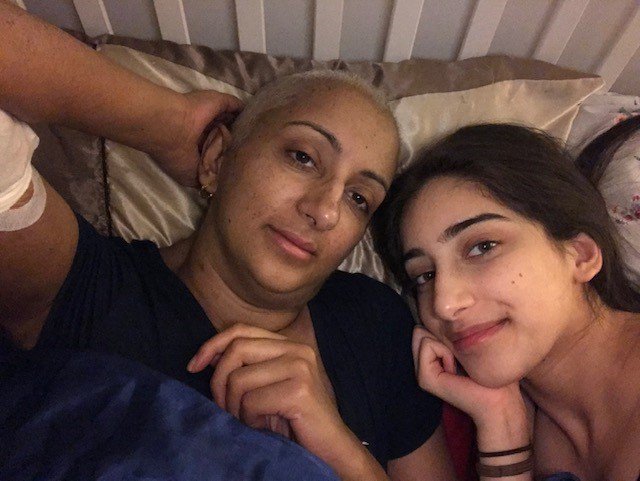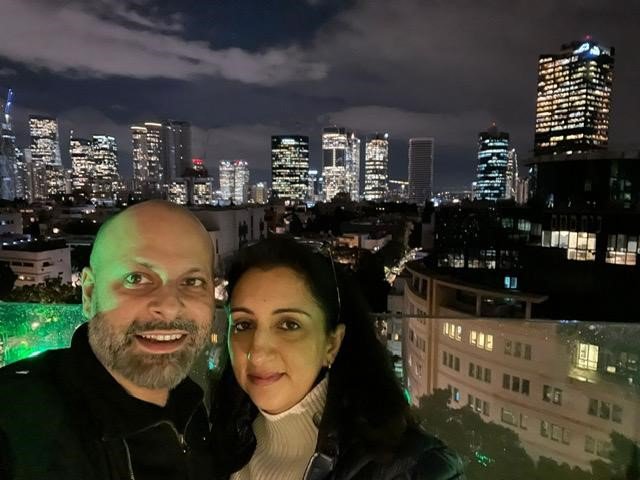My brother's stem cells saved my life, but I know others aren't as lucky
People from ethnic minority backgrounds are much less likely to find a match on the stem cell register than people from white backgrounds. This is something Kal was very aware of when she was told she had MDS and needed a stem cell transplant.

Kal (on the left) with her daughter during chemotherapy.
At first when I started feeling really tired I just put it down to a busy life. I had a long commute into work every day, doing the school run, juggling a stressful job and kids. But the tiredness slowly became exhaustion, and then my periods became really heavy to the point where they just weren’t stopping.
Eventually, after lots of investigations, I was referred to a haematologist who arranged a bone marrow biopsy. The day I found out I had MDS, I’d gone into my appointment by myself. I was just thinking she’d give me high powered iron tablets or something. But she started talking about myelodysplastic syndrome, and saying it was a form or blood cancer.
It felt like she must be talking about someone else. I thought if I had cancer I’d feel more ill, not just tired.
At first I just told my husband. It was coming up to Christmas time, and I didn’t want to tell the rest of my family at Christmas, so I waited until afterwards. But when I told them, it felt like therapy. I’d been holding this big burden inside, so it was a relief to let my loved ones know.
My family became a big support to me and to each other. My sister’s an infectious diseases doctor, so she would research everything and explain it all to the rest of the family. My dad was juicing everything in sight to get my strength up!

Kal (on the right) with her husband.
Finding out I needed a stem cell transplant
I was told that I was at high risk of the MDS turning into an aggressive type of blood cancer called acute myeloid leukaemia. The best chance of stopping this happening, and potentially curing the MDS, was to have a stem cell transplant.
Finding a donor was my next concern. I have four siblings, but there was no guarantee they would be a match. I was scared about my chances of finding a donor if none of my siblings were a match. Because among the Asian and Black communities there aren’t many donors. Before being diagnosed with blood cancer I’d never heard of stem cell donation, and neither had anyone else in my family.
Each of my siblings were tested, and luckily my younger brother was a perfect match.
The stem cell transplant was successful, but recovery was tough
I had the stem cell transplant in November 2020 and it went as well as it could. I was all set to be discharged on Christmas Eve. I’d even started packing to go home. But one day my family were facetiming me and noticed I wasn’t responding normally.
The doctors said my family could visit me (visiting was usually limited due to covid) but by the time they arrived I was having seizures. The doctors had to put me in an induced coma and it turned out I’d developed encephalitis. I was in the coma until mid-January.
After I came out of the coma I had to learn how to walk and talk again, but eventually I was able to come home. I’ve been left with epilepsy from the encephalitis, and I have some memory problems. But overall my recovery has been going well and I’ve been in remission from the MDS ever since.
Life after a transplant
Adjusting to life after cancer has been hard emotionally. When I was first diagnosed I was on autopilot. I was so focused on preparing myself, eating a healthy diet and getting myself built up physically for treatment. I kept a diary and almost treated it like a work project. It was only afterwards that it really hit me emotionally.
The biggest thing has been the anxiety. I don’t think I was an anxious person before, but I seem to have become one. I’m still trying to find ways to deal with that, and I’ve been seeing a psychologist.
I’ve gradually been getting back to work. I’ve been doing fewer and shorter days than I used to, and haven’t taken on any big projects yet. In the past work was full on, and I’d be the person logging on in the evenings and weekends. I’m trying not to do that again and have a better work-life balance.
Finding a sense of purpose
Since having blood cancer I’ve realised I want a purpose in life, and work wasn’t giving me that purpose. That’s why I contacted Anthony Nolan to raise awareness of the need for stem cell donors in ethnic minority communities. I’ve also raised awareness in my local Sikh community, and I’ve been looking into volunteering with older people who might be lonely.
Going through this experience has given me a new perspective on life. I think even if I just help one other person, it has to mean something.
Key facts
- Over 2,000 people in the UK need a stem cell transplant each year. Most of them will need stem cells from an unrelated donor.
- Only 3% of the UK's population are registered as potential donors. Only a tiny proportion of those registered to donate are from minority ethnic backgrounds.
- 72% of patients from White, Caucasian backgrounds can find the best possible match from a stranger. This drops to 37% for patients from a minority ethnic background.
Sources: Anthony Nolan and DKMS
How can I help?
To find out more about becoming a stem cell donor, go to Anthony Nolan or DKMS.
The African Caribbean Leukaemia Trust works to raise awareness of stem cell, blood and organ donation and supports people who are looking for donors.


